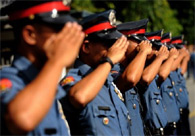The following is a statement from International Gay and Lesbian Human Rights Commission (IGLHRC) issued on Feb 28, 2013:
The International Gay and Lesbian Human Rights Commission (IGLHRC) and LADLAD LGBT Party launched a partnership with the Philippines National Police (PNP) Human Rights Affairs Office to convene a national Gender and Sexuality training program to sensitize police officers when engaging with lesbian, gay, bisexual and transgender (LGBT) people.

Ging Cristobal of IGLHRC, Raymond Alikpala of LADLAD LGBT Party and Oscar Atadero, a veteran LGBT activist and a former secretary-general of Progressive Organization of Gays in the Philippines (ProGay), planned the engagement in collaboration with Police Chief Superintendent Nestor Fajura, Chief of the Philippines National Police Human Rights Affairs Office.
Police Chief Supt. Fajura stressed that he is concerned with the consistent complaints of police misconduct his office has heard from LGBT groups. Police Chief Supt. Fajura indicated that he wants to address this concern by engaging directly with LGBT people. The training series will include an LGBT community dialogue with the PNP and six three-day gender and sexuality workshops with human rights regional officers, police precinct officers, and women’s and children’s desk officers in major provinces all over the Philippines in the coming months.
“The aim of this engagement with the LGBT sector is to sensitize the police force to bring about attitudinal change that greatly affects how the police enforce the rule of law and to make the necessary recommendations to incorporate inclusion of LGBT issues and rights in the formal training program of instructions (POI) in the policies and standard procedures of the police force,” said Police Chief Supt. Fajura.
Ging Cristobal, Project Coordinator for the Asia Program of IGLHRC, said, “This is a major breakthrough in working toward achieving equal protection for all. A history of abuse and discrimination against the LGBT community created a distrust of the Philippines National Police, which has made it difficult for LGBT advocates to engage with the police force. We are encouraged to see Police Chief Supt. Fajura’s willingness to engage with the LGBT community to address these human rights violations.”
Raymond Alikpala, author of Of God and Men: A Life in the Closet and the third Party-list nominee for LADLAD LGBT party, said, “The cooperation between the PNP and LGBT groups is significant in that the national police finally recognize the LGBT sector as an integral part of Filipino society deserving of human rights protection and that it must be included in the national human rights training program of police officers. This has not really happened before.”
Ron de Vera, Information, Education and Communication Officer of Social Action For Equality (S.A.F.E) Philippines (formerly Pink Watch Philippines), said, “The Philippine National Police has not had a clean record in the protection of LGBT persons in the Philippines. But through this partnership, we hope to turn them from an obstacle into an ally in eliminating hate crimes.”
The engagement was designed to address police extortion and the misuse of grave scandal laws against LGBT communities. “The police force’s willingness to work with us can be a seen as an effort from the Philippines government that they are serious in adapting the recommendations of the UN Human Rights Committee as noted in the concluding observations (PDF) from the Committee’s fourth periodic review of the Philippines last November,” said Ging Cristobal.
The goal is that as a result of the interaction with LGBT groups and activists, police will have a better understanding of LGBT issues and move beyond prejudicial treatment of LGBT persons. In planning this engagement, Police Chief Supt. Fajura said, “human rights are for humans and LGBT persons are not to be excluded from the protection of the police when we apply the rule of law.” With Police Chief Supt. Fajura’s support, activists are hopeful the PNP will release a policy statement supporting LGBT rights and truly apply indiscriminately the rule of law regardless of sexual orientation and gender identity.
The International Gay and Lesbian Human Rights Commission will conduct the gender and sexuality workshops in partnership with LADLAD LGBT Party and other local LGBT advocacy groups using a module developed by Ging Cristobal, designed specifically for local LGBT work. Police Chief Supt. Fajura has approved the module to be included in the orientation of new police officers.
Local participation is critical to success
“Rainbow Rights has been engaging the Philippines National Police (PNP) since 2003,” said Oscar Atadero. “We have been getting so many distress calls from lesbian, gay, bisexual and transgender people who were arrested or threatened with charges and disclosure of their identities—their civil rights were violated. We aim to get the PNP to issue memos that set a standard of proper engagement with LGBT people.”
For sustainability, the training includes a capacity-strengthening element. IGLHRC and LADLAD will train PNP Human Rights Affairs Office staff and LGBT activists to conduct the comprehensive Gender and Sexuality Workshops as well, enabling them to facilitate future sessions on their own. Speakers from local LGBT groups in each of the provinces where the training will be conducted will be invited, resulting in trainings that are customized for each community. Part of the objectives of this effort is for local LGBT groups to develop working partnerships with police officers and the Commission on Human Rights in their locality to ensure long-term impact of this project
“Our partnerships with LGBT groups in Asia are invaluable to IGLHRC,”said Ging Cristobal. “Our work supplements the great work local LGBT activists are doing. Our aim is to deepen this work by joining together to open lines of communication between civil society and state actors such as the Philippines National Police and others.”
